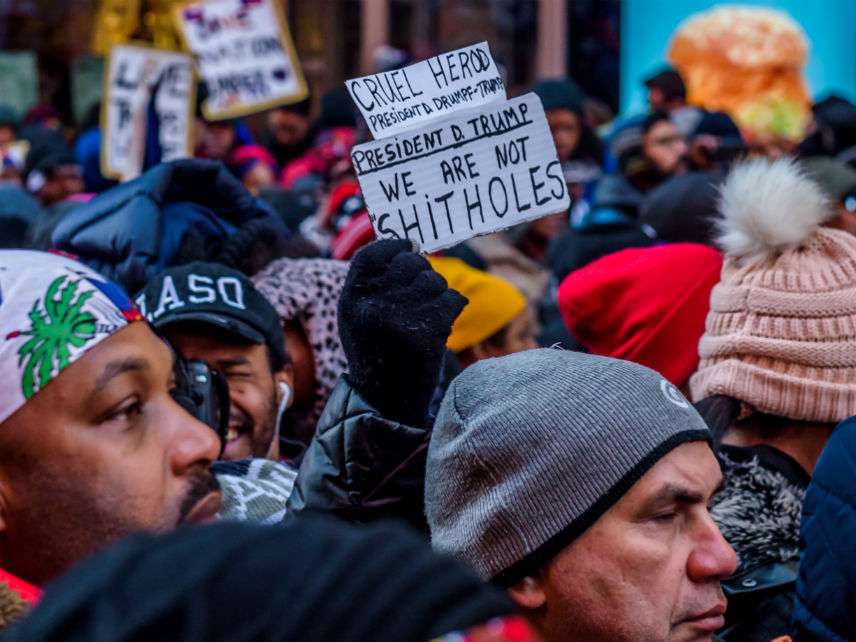The White House's Proposed Dreamer Fix Is an Abomination
It'll throw millions more immigrants under the bus than it'll save.

White House nativist-in-residence Steve Miller outlined a framework for an immigration deal yesterday. It pretends to sweeten the deal for the Dreamers—a nickname for people who have grown up as Americans but were brought to this country as minors without proper authorization—while making life even more difficult for other immigrants.
Miller's framework, laid out as a take-it-or-leave-it deal, would offer all 1.5 million Dreamers a path to citizenship in 12 years if they maintain clean records and don't become "public charges." That's all of them, not just the 690,000 who applied for temporary legal status under the Obama-era Deferred Action for Childhood Arrivals (DACA) program that Trump will begin abolishing in March. Characterizing this as "extremely generous," Miller demanded that Congress, in return, must
- create a $25 billion trust fund for a "wall system" that includes not just the Southern border but also parts of the North.
- appropriate additional funds to hire more Homeland Security personnel, immigration judges, and other staffers to crack down on the other 10 million or so undocumented immigrants.
- allow citizens to sponsor only their spouses and minor children while disbarring "extended family" such as adult children, parents, and siblings. (In an interesting bit of Orwellian double-speak, Miller calls this "protect[ing] the nuclear family.")
- make America's immigration system more "merit"-based by ending not just so-called chain migration but the Diversity Visa lottery program.
In other words, in exchange for handing Dreamers their citizenship 12 years hence, Miller wants to deport their parents now—and to cut legal family-based immigration too. And all of that without increasing employer-based immigration, unskilled or skilled. In short, he's setting up a Sophie's Choice: protect Dreamers or protect other immigrants.
This will hurt millions more immigrants than it will save. But President Trump's designs for undocumented parents are not the only troubling aspect of this proposal. The proposed changes to family-based immigration are terrible too.
Nativists have popularized the notion that letting citizens and immigrants bring in anyone other than immediate family privileges connections over skills, which they say works to the economy's disadvantage. But immigrants have always been coming to this country, establishing themselves, and then bringing in other family members. Trump himself wouldn't be in the country if his German grandfather, who spoke little English, hadn't came to the United States at the age of 16 in 1885 to join his older sister. Indeed, thanks to decades-long backlogs in various family-based categories, there is less chain migration to the United States now than when Trump's grandfather came. (Only about a third of the relatives admitted under these categories currently are non-nuclear family members.) Had the system worked then the way it works now, he might never have been admitted to America and his grandson would now be tormenting poor Angela Merkel for her refugee policies instead.
Chain migration worked to America's advantage then, and it does so now. Only a third of the immigrants admitted under the family-based immigration system currently would even count as "chain migrants"—and that's by the nativists' loose definition of the term. And those chain migrants do spectacularly well. A study by College of William and Mary's Harriet Duleep and formerly of the National Science Foundation's Mark Regets examined three decades of census data and found no difference in the final earnings of foreigners sponsored by family members versus those sponsored by employers. Though the former make less money than the latter initially, they make bigger income gains subsequently.
Why? Because foreigners who come on family visas aren't tied to specific jobs or occupations. They are therefore far more open to acquiring new skills to go into fields where they expect the best returns. Also, since they don't have jobs lined up when they arrive, they have a lower opportunity cost for starting businesses—especially since they can count on family support. Finally, the "best and brightest" immigrants, who have many options, often pick America as their destination because they have family here.
The White House plan is a clever ploy to use the Dreamers as leverage to advance a nativist agenda. (It's propsed cuts in legal immigration alone could add up to 40 percent.) If Democrats balk at betraying other immigrants to save this one group, Trump can turn around and blame them when he starts deporting the DACA recipients. If they do embrace the deal, Trump can position himself as the great savior of Dreamers while cracking down on other immigrants. It's a heads-I-win, tails-you-lose offer.
Saner lawmakers on both sides of the aisle should hammer out a more tenable alternative, one that focuses mainly on protecting Dreamers without throwing anyone else under the bus. And then they should tell the White House to take it or leave it. Broader reforms can wait til Trump and Trumpism have been relegated to the dustbin of history.


Show Comments (298)